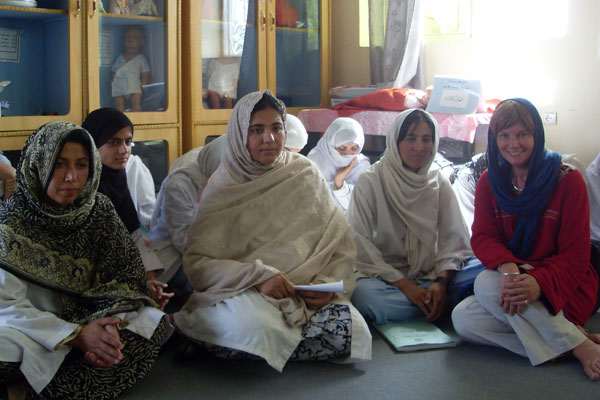
I've been reflecting on the changes to people's lives in Afghanistan, particularly women, over the last ten years of UK involvement there. In the UK, women take it for granted that when we have a baby we will get good prenatal support, give birth in a clean hospital, that our baby will survive, and that we will get post-natal support in adjusting to this life-changing event.
Unfortunately this is not the case for women in Afghanistan, where giving birth is one of the most dangerous things she will do in her life. In 2008 Afghanistan had one of the highest rates of maternal death in the world. Nationally, 1400 women die for every 100,000 live births; in the UK, it is just over eight.
Since the fall of the Taliban, there has been a massive improvement in access to healthcare services for ordinary people. Now, 57% of the population is within one hour's walking distance of some kind of health facility, which has made a huge difference to women's lives. But for women living in more conservative parts of the country, it is still difficult for them travel outside their home without being accompanied by a male relative. This makes regular ante-natal check ups and assisted births an issue.
The solution lies in community midwives: young women who train for 24 months away from their community on the basics of midwifery and infant care. The young women are selected by their communities, their family, their local village elder and the mullah, who agree to support them to practice as community midwives once they finish their training. The programme has provided a lifeline for women unable to leave their villages, as they get regular check-ups, skilled assistance with giving birth, and essential post-birth advice which helps them give their babies get the best start in life.
The most important aspect of this scheme is that the community is behind the women's work. Because the women are handpicked by their communities, they have their full trust and community members will go out of their way to help with things like transport if complications happen in birth and the mother needs to be rushed to hospital. The scheme also helps the midwives who work in parts of the country where security is an issue. Every day they save countless women's lives, and early indications show positive progress.
On my recent trip to Helmand, I met 24 of the trainee midwives who came from nearly all the districts in the province. They looked smart in their new uniforms and on first appearance seemed shy. Their passion for their vocation was apparent when I asked them what advice they would give a new mother about breast-feeding. Hands shot up when they confidently replied that mothers should give nothing but breast milk for the first six months, but that the most important milk was the first milk, the colostrum which provides both nutrition and vital anti-bodies to protect the baby from infection.
The first wave of community midwives in Helmand graduated last year and have stayed in the province working in private clinics or with NGOs. It is great that they are providing care to the women of Helmand, but for pregnant women who cannot leave their communities, this second wave of graduates will transform their lives and futures. The community support for their training is important to these women, and several of the trainees rushed off during our meeting to show me letters of support their community elders had given them!
A few weeks earlier I visited the Malalai Women's Hospital in Kabul, which was the only hospital that remained open during the rule of the Taliban. Interestingly, it is named after a woman who urged on the Afghans to defeat the British in the Battle of Maiwand in 1880. Maiwand is on the Helmand border, and the hospital is famous for providing emergency obstetric care for women across the country. They only deal with difficult cases and every day 10-15 babies are delivered there. All the staff are women and provide high quality healthcare for anyone.
I've visited a lot of hospitals in my time working in development and this was the finest government facility I've ever seen in a poor country. It is an island of excellence, but the young women that I met in the training centre will have the opportunity to spread their expertise to others in their own communities.
I was impressed with these young women who were proud to serve their communities and rebuild their country. They are doing vital work, and some will work in communities where security is still an issue. They are role models to the country and show that skilled women can play an important role in strengthening their communities. I congratulated them and said: "You have a very special task. Quite literally you are holding Afghanistan's future in your hands."

Recent Comments